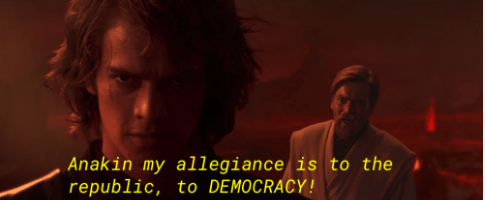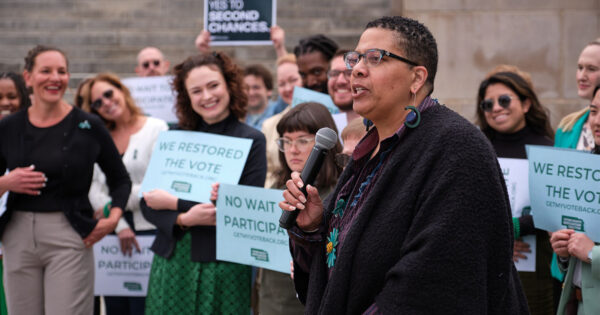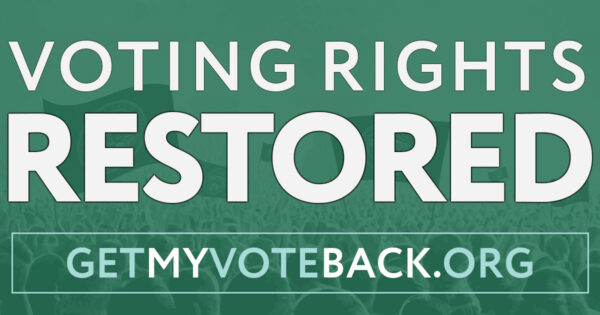Because Civic Nebraska’s core mission is to create a modern and robust democracy for all Nebraskans – a phrase that is reflected in our seal – here’s a question we often hear: Is the United States a democracy or a republic? At which point we usually interject, in our best lawyer voices: “Objection, your honor! False dichotomy!”

The terms republic and democracy are not, and have never been, mutually exclusive in our country. Saying the United States is not a democracy but a republic is like us saying Civic Nebraska doesn’t have an Office Dog, it has an Office Australian Shepherd. Not just one answer is true here (and by the way, isn’t Birdie awesome?).
Still, this It-Has-To-Be-One-Or-The-Other perception persists, as if democracies and republics were somehow inverse of one another. Sometimes, it even comes from places where we least expect it. In 2018, during a contentious clash with FBI Agent Peter Strzok at a hearing of the House Judiciary and Oversight Committee, Rep. Paul Gosar of Arizona offered this:
“We are not a democracy. We are a constitutional republic. That is why we have two ways – both from a democracy, voting, and where we have the Electoral College. So make sure we keep that straight.”
But the words “democracy” and “republic” aren’t for us to just haphazardly define, making them each mean something we wish them to be in the context of a political argument. In a system that requires facts to function, it is important to understand exactly what words mean.
So, to paraphrase, let’s make sure we keep this straight:
››The United States is a republic, commonly defined as “a state in which the supreme power rests in the body of citizens entitled to vote and is exercised by representatives chosen directly or indirectly by them.” This defines the American form of government, from federal on down to local jurisdictions.
›› The United States is a democracy, commonly defined as “government by the people; a form of government in which the supreme power is vested in the people and exercised directly by them or by their elected agents under a free electoral system.” This, too, defines the American form of government, from federal on down to local jurisdictions.
This is usually when we are reminded of quotes like A republic, sir, if you can keep it. Or the Framers’ concern about “the tyranny of the majority,” which resulted in checks and balances in our constitutional system of government. It’s important to note, though, that from the times of the Framing, these two words have been interchangeable in America.
Yes, as they ruminated over a strong central government, several of our nation’s 18th-century architects took a crack at the differences between “republics” and “democracies” – James Madison focused on the indirect democracy of a republic vs. a “pure” democracy of all-majority rule. But at the same time, the Framers and Founding Fathers also referred to both “republics” and “democracies” or “representative democracies” when discussing American government. In other words: We have a long history of understanding the term democracy as meaning representative democracy.
So why does the false dichotomy persist? It seems rooted, frankly, in its convenience to score political points. Throughout our history, Americans on all points of the political spectrum have used the language of republicanism to explain unpopular actions by government representatives. First comes the call that the action is anti-democratic; then, the predictable rejoinder of “we’re a republic, not a democracy.”
Which, we’d have to say, is a wee bit intellectually dishonest. Obviously, America is not a direct democracy – which we all know simply from living here in the past two-plus centuries. A vast majority of laws and government decisions are not made by a majority public vote. That’s only practical; every national decision can’t be like that scene in Hoosiers when the whole town of Hickory votes on whether to keep Norman Dale as the high school basketball coach.
Still, throughout our history, our representative democracy has moved around a bit on the scale. U.S. senators, for example, used to be picked by state legislators; now they’re voted in via statewide elections. Or, put another way, that’s a more democratic way of choosing our senators in our republican system. Meantime, state and local referendums have become popular ways to allow citizens to vote on everything from bond issues on new arenas to marriage equality or the death penalty. These are pointed to as evidence of direct American democracy – democracy in the original sense, though these up-or-down votes tend to be few and far between compared with the overwhelming majority of the lawmaking that gets done in our country, states, and local jurisdictions.
It’s worth noting that Rep. Gosar used the term constitutional republic. He’s not wrong, but he is being intentionally vague. If you really, really want to get right down to specifics, today the United States could be accurately defined as a federal constitutional republican representative democracy (say that ten times fast). Or if you’d like to get it down to two easy words, a democratic republic works, too.
The bottom line: In the parlance that dates back to the Framing, the United States is both a democracy and a republic – organized to reflect rule by the people, and, by necessity, organized to reflect the inherent rights of the people. There can be democracy without a republic, but there can be no real republic without democracy.
And if you still don’t agree with how the two terms clearly interact, maybe Obi-Wan Kenobi can convince you on the matter.




